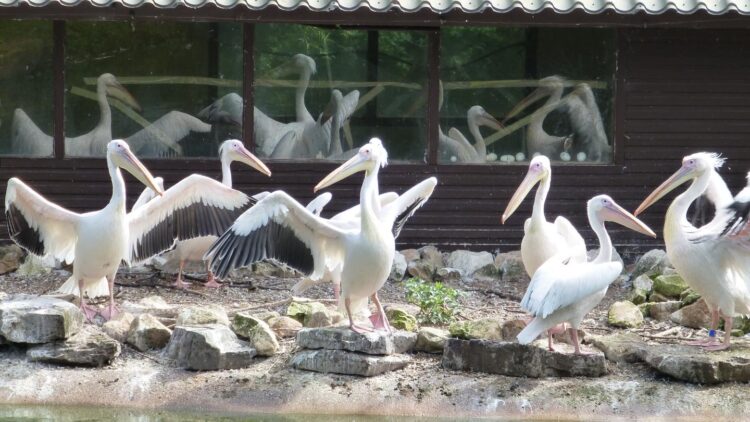
Credit: Dr Paul Rose
Captive pelicans that are free to choose their own friendships are more likely to breed successfully on repeated occasions, new research suggests.
Social network analysis on captive great white pelicans, led by the University of Exeter, found that providing social choice within the flock and allowing partnerships to form naturally led to improved breeding success.
The study revealed that the pelicans chose their specific social relationships, and that there was a social structure across the flock, in which sub-adults (the equivalent of teenagers) spent more time with each other than with adult birds.
Zoo-housed pelicans are common, but their breeding record is poor and they receive little research attention, compared to other popular birds in zoos such as penguins.
As great white pelicans are long lived and hard to breed in captivity, they need careful management.
The team – from the University of Exeter, University Centre Sparsholt and Reaseheath College – collected data at Blackpool Zoo on the behaviour, space use and association preferences around the nesting events of great white pelicans in 2016 and 2017.
“Evaluating space use and behaviour to ensure that pelicans have the choice to behave in a way that they wish is essential to good animal welfare,” said lead author Dr Paul Rose, of the University of Exeter and WWT Slimbridge Wetland Centre.
“Social network analysis enables us to identify the strongest bonds and discover who is influential in the flock. Therefore we can work out which birds might initiate breeding and encourage this activity in others.
“This is important for flock management. If birds are to be moved between flocks, we should preserve these important bonds and the experience they provide.
“Alongside the good care the birds get from zoo staff, this experience of what to do and when to do it is likely why the flock we analysed nested successfully on multiple occasions.”
The research team also identified specific behavioural cues that might tell pelican keepers when breeding is likely to happen.
For example, data collected before the pelicans began nesting showed that the flock was more vigilant during this time, suggesting that vigilance may be a precursor for courtship or nesting activity.
###
The paper, published in the journal Zoo Biology, is entitled: ‘Understanding sociality and behavior change associated with a nesting event in a captive flock of great white pelicans’.
Media Contact
Lauren Batten
[email protected]
Related Journal Article
http://dx.





